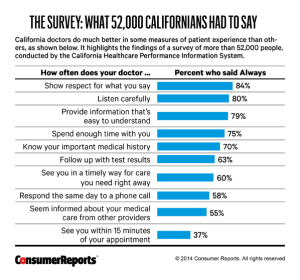10 Tips on How To Choose A Cataract Surgeon
10 Things You Should Do When Choosing a Cataract Surgeon (and one mistake you should avoid)
Most people consider their eyesight to be their most important sense. Yet, each year millions of people have eye surgery without doing any research on their eye doctor. Choosing the ophthalmologist who will be performing your cataract surgery is one of the most important decisions you will ever make; so it makes sent to invest some time in finding the best ophthalmologist for your eye procedure. Luckily, it doesn’t take a lot of time to do the research necessary to find the best doctor for cataract surgery in your area. The following list of 10 things you should do before choosing your cataract surgeon will explain how to go about it. With this list you can find a cataract surgeon in less time than many people devote to choosing their next car.
1. Understand that “In-Network” is not a Certification of Skill
Despite what may be stated in your health insurance’s marketing materials, there is no objective evidence that in-network surgeons provide better quality care. Currently there isn’t a tried-and-true, scientifically sound method for rating the quality of physicians. Any insurance company that suggests that the doctors participating in its own network provide better quality care is painting an inaccurate picture. Insurance companies work very hard to align the interests of their in-network physicians with their own, often to the patient’s disadvantage.
2. Ask people you trust
One relatively reliable method of finding a good ophthalmologist is to ask around. Good sources of information include your internist, optometrist, and friends who have had cataract surgery. Even better sources are the operating room nurses and staff at your local hospital. They are often in surgery with eye doctors and know who has the “best hands.” Nurses are, by nature, very helpful people and will often be happy to answer your questions. The challenge will be getting past the hospital’s automated telephone menu and gaining access to a live operating room nurse. I would suggest calling the hospital’s main number in the morning. Choose the option for a live operator. Once you have a live person, ask to be transferred to the operating room nursing station. A nurse will often pick up once the line is transferred.
3. Research your surgeon’s education
Where did your eye surgeon train? It’s fairly easy to check the ratings for various training programs. Two objective resources are U.S. News & World Report’s annual ratings:
Don’t get too hung up on the ranking order. Surgeons trained at any of the top 20 institutions received a top-notch education. (See Dr. Richardson’s Education & Training background).
4. Research your surgeon’s state licensure
Within the United States, doctors are licensed by state. Make sure your eye doctor is licensed to practice medicine in your state. Go to your state medical board’s Web site and do an online search. In addition to confirming a surgeon’s licensure, many state license Web sites will also tell you whether there has been any disciplinary or legal action taken against your surgeon. In California, for example, you can look up this information License Verification
5. Confirm that your surgeon is board-certified
When physicians become board-certified, it guarantees they have met minimum competency requirements. In order to become certified, an eye surgeon must successfully pass both a written and oral examination. Additionally, younger surgeons must recertify within the field of ophthalmology every 10 years. Confirm that your ophthalmologist is board-certified by visiting www.abop.org or www.abms.org.
6. Visit the Website of your Cataract Surgeon
You can often obtain very useful information from your eye surgeon’s Web site. However, keep in mind that the primary goal of most Web sites is to market the practice. You won’t find anything negative about your doctor there, but it can give you more insight into the surgeon’s background, experience, use of technology, and practice philosophy. It may also provide information about what you should expect during your consultation with the ophthalmologist, the surgeon’s preferred intraocular lens used to replace the cataract, and whether s/he offers multifocal (such as the Tecnis Multifocal or Acrysof IQ Restor) or extended depth of focus (e.g. the Symfony) artificial lens options.
7. Find out what other patients have experienced
Are testimonials from satisfied patients available on your surgeon’s Web site or physician-ranking Web sites? Can you review testimonials in your surgeon’s office? Will your surgeon provide the names and phone numbers of patients who have offered to act as references? It shouldn’t be too hard for your surgeon to come up with a list of people willing to discuss their cataract surgery experience with you. Keep in mind, however, that federal privacy regulations limit the amount of information a surgeon may be able to offer regarding other patients who have had surgery.
Cataract Surgeon Reviews and Ratings:
There are many review and directory sites online which allow patients to rate their doctor and/or leave a review/testimonial. Not all are reputable, however. Some have questionable approval procedures that either filter out legitimate reviews or allow paid, false reviews. Ophthalmologists (especially cataract surgeons) tend to care for older individuals who may not write online reviews as frequently as younger patients might, so their reviews are more likely to be filtered out by Yelp! That being said, two physician review sites have gotten the nod from Consumer Reports:
- Healthgrades.com (See Dr. Richardson’s profile on Healthgrades.com)
- RateMDs.com (See Dr. Richardson’s profile on RateMDs.com)
8. Find out how many cataract surgeries your doctor has performed
There is a reason they call it the “practice of medicine.” Just like a sports pro, a surgeon’s abilities improve with practice and experience. Every surgeon requires a minimum number of “cases” to become proficient. For cataract surgery, this number is probably around 500. Still not comfortable? Find someone who has performed over 1,000 cataract surgeries.
How do you find out the number of cataract surgeries your surgeon has done? Just ask. If you are uncomfortable asking this question, then bring someone to your appointment who will ask for you. This is a very important question. These are your eyes. You only have two. Get over your hesitation.
9. Meet your surgeon

One of the most important criteria for choosing surgeons is your ability to trust them. Meet with your surgeon. Make sure you feel comfortable with what your surgeon says and with the level of care that will be provided. Trust is an important consideration that cannot be sufficiently developed until you talk with your surgeon face to face.
A 2014 California Doctor Rating survey of more than 52,000 Californians revealed the top criteria that matter to patients. When you meet with your surgeon, it may be helpful to consider these criteria as well.
[Reference: Consumerreports.org. Top-rated California Doctors – Consumer Reports [Internet]. 2015 [cited 2015 Jul 8]. Available from: http://www.consumerreports.org/cro/news/2015/01/top-rated-california-doctors/index.htm]
10. Get a second opinion from another ophthalmologist
Most people wouldn’t purchase a car without test-driving at least one other car. Cataract surgery is a very important decision and getting a second opinion is a smart idea. Many people are uneasy about getting another opinion, but a second opinion is a common medical practice encouraged by the best surgeons.
Indeed, one quick test of your surgeon’s comfort with their own abilities is to let them know that you’ll be getting a second opinion. If the surgeon becomes defensive about this, then you’ll know a second opinion is a good idea, after all.
Unless you are completely comfortable with your surgeon, get a second opinion.
Finally, avoid the following mistake
Don’t assume High Tech is Equal to Top Skill
The best cataract surgeons are not just the most skilled at cataract surgery, they also provide a thorough consultation, assessing their patients’ vision problems, determining surgery risks unique to each patient, and planning the most appropriate treatment options. Modern technology is required to allow the surgeon to detect subtle eye diseases that might impact the final vision after cataract surgery, choose the most appropriate intraocular lenses (“IOLs”), and avoid unwanted side effects that can be associated with certain multifocal lens implants. Almost all of the diagnostic technology available in the cataract surgeon’s office will be of benefit to any patient considering cataract treatment options.
There are also many technologies available in the operating room that can assist the cataract specialist during the surgery. Some of these technologies make it easier for the cataract surgeon to choose the most appropriate intraocular lens power or even to most accurately align the artificial lens in the eye. However, a skilled cataract surgeon does not generally need the patient to pay $1,000-2,000 out of pocket for laser cataract surgery. To date, there is no evidence that femtosecond laser cataract surgery results in better vision or is preferred by the most skilled ophthalmologists. If, in your search for the best cataract surgeon, you have chosen an ophthalmologist who recommends laser cataract surgery, then that may very well be the best procedure for you. However, it would be unwise to choose a cataract surgeon based primarily on whether s/he performs laser cataract procedures.
Choosing your eye doctor is one of the most important decisions you will make in your life. With Dr. David Richardson, you are not only getting a highly skilled eye surgeon, but a trusted physician as well.

